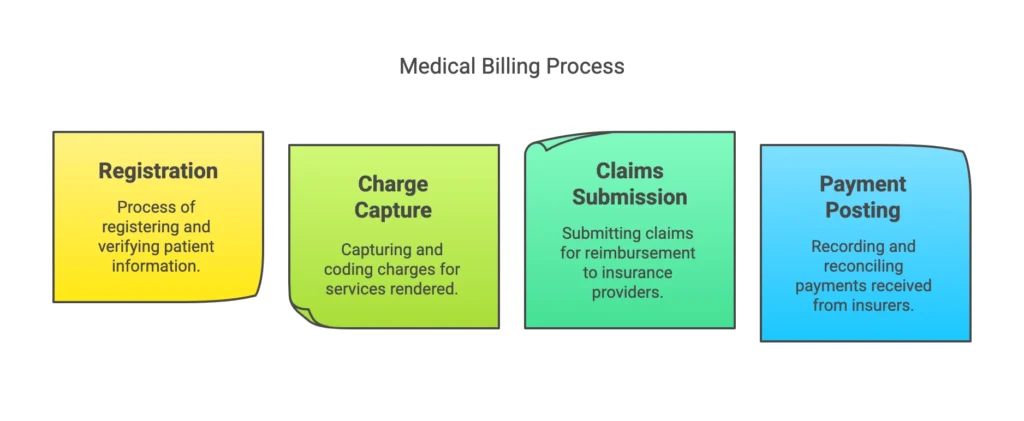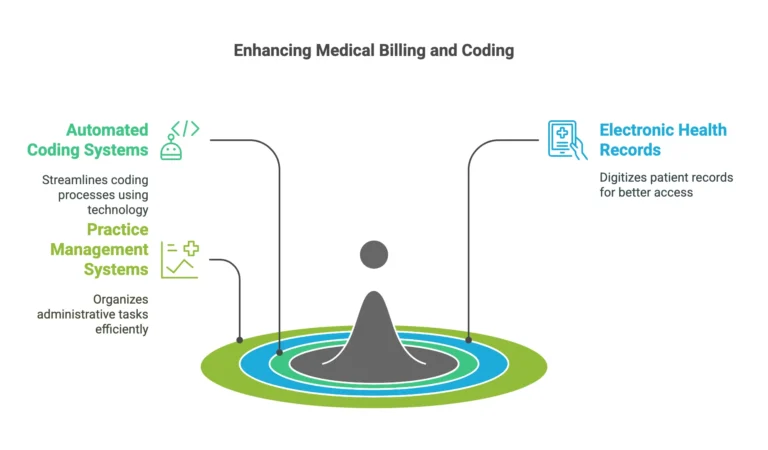Become a Medical Billing and Coding Pro: Boost Your Career Today
The healthcare industry needs medical billing and coding experts. They make sure healthcare services get paid on time. Their role is growing, making them more important.

To do well in this field, you must know a lot about medical billing and coding. It’s about giving codes to diagnoses and procedures. These codes help create claims for payment. Learning this can help you advance in your career and help healthcare run smoothly.
Understanding the Fundamentals of Medical Billing and Coding
Medical billing and coding are key parts of the healthcare world. They help providers get paid for their work. Billing sends claims to insurance companies. Coding assigns codes to diagnoses and procedures.
These codes, like ICD-10 and CPT, sort and group patient data. This makes billing easier.
In medical billing and coding, being precise is vital. People in these roles need to know coding systems, insurance rules, and laws well. Their job is to make sure providers get paid right and on time. This lets them focus on caring for patients.
Some important parts of medical billing and coding include:
- ICD-10 coding system: used for classifying diagnoses and procedures
- CPT coding system: used for classifying procedures and services
- Insurance guidelines: understanding the rules and regulations of various insurance companies
- Regulatory requirements: complying with laws and regulations governing medical billing and coding
Learning about medical billing and coding can lead to a fulfilling career. With more need for skilled workers, it’s a great time to start. You can help healthcare run smoothly by mastering these skills.
Required Skills and Qualifications for Success
To do well in medical billing and coding, you need the right skills and qualifications. Getting an education and training is key. The American Academy of Professional Coders (AAPC) and the American Health Information Management Association (AHIMA) offer training and certifications.
Important skills for success include:
- Knowledge of medical terminology and coding systems
- Understanding of medical credentialing and revenue cycle management (rcm)
- Attention to detail and analytical skills
- Ability to work with electronic health records and practice management systems
Medical billers and coders must also keep up with new rules and guidelines. Getting the right education and training helps you succeed in this field. This includes roles in rcm.
With the right skills, medical billers and coders are vital for healthcare’s financial health. They ensure quality patient care. Knowing about medical credentialing and rcm helps you make smart choices for your career.
Mastering Revenue Cycle Management (RCM)
Revenue cycle management (RCM) is key in medical billing and coding. It makes sure healthcare providers get paid right and on time. It covers steps like patient registration, charge capture, and claims submission. Learning RCM helps medical billers and coders boost their clients’ finances.
The RCM journey starts with patient registration. Here, patient info is checked and recorded. Then, charges are assigned to services. Claims are sent to insurance companies next. Knowing medical billing and coding well is essential for RCM.
Some important parts of RCM include:
- Patient registration and verification
- Charge capture and coding
- Claims submission and tracking
- Payment posting and reconciliation
By getting good at these, medical billers and coders can make the revenue cycle smoother. This leads to better finances and care for patients.
Good RCM also needs analytical and problem-solving skills. Billers and coders must understand data to improve the cycle. Keeping up with new trends and best practices helps them and their clients succeed financially.

Professional Certifications and Training Pathways
In the field of medical billing and coding, getting certified is key. Certifications like the Certified Professional Coder (CPC) or the Certified Medical Reimbursement Specialist (CMRS) boost your career. They show you’re serious and skilled, which employers love.
Having these certifications means better job security and higher pay. They also open doors to more career growth. Plus, they prove you know your stuff in coding and billing, which is vital for managing revenue.
Medical credentialing is also a big part of the job. Certifications keep you updated on new rules and guidelines.
Here are some top ways to get trained:
- Associate’s degree programs in medical billing and coding
- Certificate programs in medical coding and billing
- Online training courses and certification programs
- Professional associations and organizations, such as the American Academy of Professional Coders (AAPC)
By getting certified and trained, you show you’re dedicated and skilled. This puts you ahead in the job market. With the right training, you can shine in medical billing, coding, and credentialing. You’ll help healthcare run smoothly.
Essential Tools and Software in Medical Billing and Coding
Medical billing and coding experts use many tools and software to make their work easier. Systems like practice management and electronic health records are key. They help manage patient data, track billing, and follow rules.
Some important tools and software include:
- Billing and coding software, such as Epic Systems and Cerner Corporation
- Electronic health records (EHRs) systems, such as Athenahealth and eClinicalWorks
- Practice management systems, such as Kareo and Greenway Health
These tools help professionals work better and faster. They automate tasks and make workflows smoother. This lets them focus on giving great service to patients and healthcare providers.
Medical billing and coding experts also need to keep up with new rules and guidelines. With the right tools and software, plus knowledge and skills, they can do well in their jobs. They help the healthcare industry a lot.
| Tool/Software | Description |
|---|---|
| Billing and Coding Software | Streamlines billing and coding processes |
| Electronic Health Records (EHRs) | Manages patient data and tracks billing |
| Practice Management Systems | Automates tasks and streamlines workflows |
Building Your Career in Medical Credentialing
Medical credentialing is key in healthcare, making sure providers get paid right and on time. It’s a field that offers both challenges and rewards. You can choose from many roles, like medical billing and coding, credentialing specialist, or revenue cycle manager.
These roles are essential for managing the revenue cycle. They ensure providers are credentialed and get paid for their work. You can work in hospitals, medical groups, or insurance companies.
Medical credentialing pros do important tasks. They include:
- Checking if healthcare providers are qualified
- Managing the RCM process for timely payments
- Following rules and standards
- Looking at data to find ways to improve
Starting a career in medical credentialing can be very rewarding. It’s in high demand in healthcare. With the right training, you can move up to leadership roles like revenue cycle manager or director of medical credentialing.
| Role | Responsibilities | Required Skills |
|---|---|---|
| Medical Billing and Coding Specialist | Verifying credentials, managing RCM process | Knowledge of medical coding systems, attention to detail |
| Medical Credentialing Specialist | Verifying credentials, ensuring compliance | Knowledge of regulatory requirements, analytical skills |
| Revenue Cycle Manager | Managing RCM process, analyzing data | Knowledge of RCM principles, leadership skills |
Advanced Techniques for Accuracy and Efficiency
In medical billing and coding, being accurate and efficient is key. This ensures healthcare providers get paid on time for their work. To do this, professionals use advanced methods like data analytics and process improvement. These help spot where things can get better and make workflows smoother.
Some top techniques in medical billing and coding include:
- Automated coding systems
- Electronic health records (EHRs)
- Practice management systems
These tools make the billing and coding process faster and less prone to mistakes. This boosts productivity.
Using these advanced methods, medical billing and coding pros can grow their skills and knowledge. This opens up better job chances and career moves. Plus, data analytics and process improvement help spot trends. This leads to smarter decisions and better results.
Advanced techniques are vital for keeping medical billing and coding accurate and efficient. By keeping current with new tools and tech, professionals can offer top-notch services. This helps the healthcare industry succeed as a whole.

Earning and Career Advancement in Medical Billing and Coding
Medical billing and coding offer great earning and career growth chances. The field is always changing with new tech and rules. To keep up, professionals must stay current.
Location, experience, and certification greatly impact earnings. For instance, those with AAPC or AHIMA certifications often earn more. This is because they have proven their skills and knowledge.
Here are some career paths and salary ranges in medical billing and coding:
- Medical Billing and Coding Specialist: $40,000 – $60,000 per year
- Medical Credentialing Specialist: $50,000 – $70,000 per year
- Revenue Cycle Manager: $70,000 – $90,000 per year
Medical billing and coding also lead to medical credentialing roles. These roles verify healthcare provider credentials. This career path offers growth, challenges, and advancement opportunities.
| Job Title | Salary Range | Job Description |
|---|---|---|
| Medical Billing and Coding Specialist | $40,000 – $60,000 per year | Responsible for assigning codes to diagnoses and procedures, and preparing and submitting claims to insurance companies. |
| Medical Credentialing Specialist | $50,000 – $70,000 per year | Verifies the credentials of healthcare providers and ensures that they meet the necessary standards and regulations. |
| Revenue Cycle Manager | $70,000 – $90,000 per year | Oversees the revenue cycle process, including patient registration, billing, and collections. |
Conclusion: Taking Your Medical Billing and Coding Career to the Next Level
Pursuing a career in medical billing and coding opens many doors for growth and satisfaction. By learning the skills, getting the right certifications, and using the right tools, you become a key player in healthcare. This field is always changing, and you can thrive in it.
To keep growing, always be ready to learn more. Keep up with new trends, rules, and top practices in medical billing and medical coding. Look for chances to get more training, earn certifications, and connect with others in your field.
The healthcare world is always changing, and the best medical billing and coding pros are flexible, creative, and committed to excellence. By always looking to improve and striving for the best, you can reach new levels in your career. You’ll make a big difference in the lives of patients and healthcare workers.
FAQ
What is the role of a medical biller and coder?
Medical billers and coders are key in healthcare. They make sure providers get paid right and on time. They turn medical info into codes, send claims, and manage the whole billing process.
What are the required skills and qualifications for success in medical billing and coding?
To succeed, you need to know medical terms, anatomy, and coding well. You also need to be detail-oriented and good at solving problems. Having a certification like CPC or CMRS is often preferred by employers.
How important is revenue cycle management (RCM) in medical billing and coding?
RCM is very important in medical billing and coding. It covers everything from patient registration to getting paid. Medical billers and coders make sure this process is accurate and efficient, which helps healthcare providers financially.
What are the different professional certifications available in medical billing and coding?
There are many certifications for medical billers and coders. The CPC from AAPC, CMRS from AMBA, and RHIT from AHIMA are some examples. These show you’re skilled and dedicated, which can help you get better jobs and earn more.
What are the essential tools and software used in medical billing and coding?
Medical billers and coders use many tools and software. These include systems for managing practices, EHRs, and billing software. These tools help make their work faster and more accurate.
What are the career advancement opportunities in medical credentialing?
Medical credentialing is a special part of billing and coding. It deals with making sure providers can get paid by insurance. You can move up to roles like credentialing specialist, revenue cycle manager, or practice consultant.
